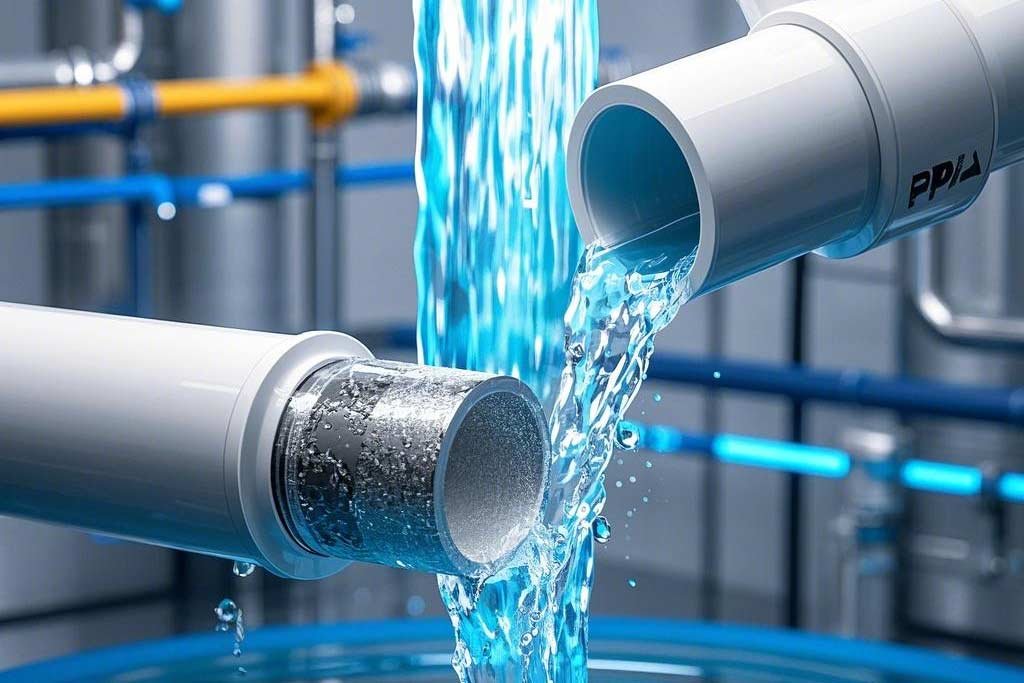Introduction of PPR Water Pipes
Polypropylene random copolymer (PPR) water pipes are widely used in residential, industrial, and commercial plumbing systems because of their excellent mechanical properties. PPR pipes are known for their durability, ease of installation, and resistance to corrosion and scaling. However, microbial contamination in water pipes can cause biofilms, bacterial growth, and even waterborne illnesses. To improve hygiene and prevent bacterial proliferation, antibacterial agents such as zinc-ion additives can be incorporated into PPR pipes.
The Challenges of Microbial Growth in PPR Pipes
Although PPR pipes offer many benefits, their polymeric nature, combined with exposure to water, provides an ideal environment for microbial development. Some of the most common issues related to bacterial growth in water pipes include:
- Biofilm formation, which can block pipes and reduce water flow.
- Pathogenic bacteria such as Escherichia coli and Legionella.
- Water discoloration and unpleasant odors.
- Reduced lifespan of pipes due to microbial degradation.
To mitigate these problems, it is essential to treat PPR pipes with an antibacterial agent.
Introduction to Zinc Ion Antibacterial Agents
Zinc-ion antibacterial agents are known for their broad-spectrum antimicrobial activity, long-lasting effect, and environmental safety. These agents release zinc ions (Zn²⁺), which disrupt bacterial cell walls, interfere with protein synthesis, and inhibit microbial reproduction. Zinc ion agents offer several advantages:
- Effective against a wide range of bacteria and fungi.
- Long-term stability without significant leaching.
- Non-toxic and safe for human health.
- Eco-friendly compared to traditional antibacterial agents such as silver and organic biocides.
Incorporation of Zinc Ion Antibacterial Agents into PPR Pipes
The integration of zinc-ion antibacterial agents into PPR pipes is achieved through compounding and extrusion. The general process includes:
- Selecting Antibacterial Additives: A zinc-ion-based antibacterial additive or masterbatch is chosen for compatibility with PPR resin.
- Compounding: The zinc-ion antibacterial agent, along with stabilizers and processing aids, is blended with PPR resin in a twin-screw extruder to ensure uniform distribution.
- Extrusion and Pipe Forming: The compounded material is extruded through a die and cooled to solidify the pipe structure.
- Testing and Quality Control: The PPR pipes are tested for antibacterial properties, mechanical strength, and compliance with water quality standards.
Methods of Antibacterial Performance Testing
To evaluate the antibacterial properties of zinc-ion agents in PPR pipes, various standard testing methods are used:
Antibacterial Activity Test (ISO 22196 / JIS Z 2801)
This test measures the reduction rate of bacteria such as E. coli and Staphylococcus aureus. Antibacterial efficacy is usually expressed as “log reduction,” indicating the decrease in bacterial colonies over a specified period.
Zone of Inhibition Test
This method assesses antimicrobial action by placing a bacterial culture on the pipe surface and measuring the zone where bacterial growth has been prevented.
Leaching Test
This test determines the stability of zinc ions in PPR pipes to ensure that antibacterial agents remain within the polymer matrix without excessive leaching into the water.
Biofilm Resistance Test
A long-term test conducted in a controlled environment to assess the resistance of zinc-ion-treated PPR pipes against bacterial biofilm formation under real-world conditions.
Benefits of Zinc-Ion Antibacterial PPR Pipes
Incorporating zinc-ion antibacterial agents into PPR pipes provides several benefits:
- Improved Hygiene: Prevents bacterial growth, ensuring a safer water supply.
- Long-Lasting Protection: Stable zinc ions provide continuous antibacterial action throughout the pipe’s lifespan.
- Eco-Friendly and Non-Toxic: Zinc ions are environmentally friendly and safe for human consumption.
- Enhanced Water Quality: Reduces contamination and biofilm formation, maintaining clean and odor-free water.
Applications of Antibacterial PPR Pipes
Zinc-ion antibacterial PPR pipes are suitable for a wide range of applications, including:
- Drinking Water Systems: Ensuring potable water distribution in residential and commercial buildings without microbial contamination.
- Medical and Healthcare Facilities: Providing sterile water supply systems in hospitals and clinics.
- Industrial Water Supply: Preventing bacterial growth in cooling and processing water pipelines.
- Public Water Infrastructure: Enhancing safety in municipal water distribution networks.
Conclusion
Incorporating zinc-ion antibacterial agents in PPR water pipes represents a major advancement in the plumbing industry. It provides long-term protection against microbial contamination, ensuring cleaner and safer water systems. By leveraging the antimicrobial properties of zinc ions, manufacturers can enhance the performance, durability, and hygiene of PPR pipes. Continuous research and development will further improve formulations and expand the application of antibacterial PPR pipes in industrial and household settings.


-300x210.jpg)
